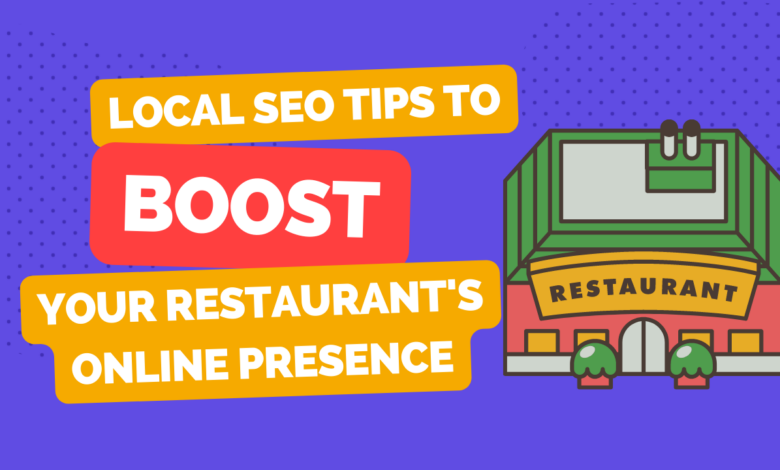Boost Your Restaurant’s Online Presence with These Local SEO Tips

Introduction
In today’s digital age, having a strong online presence is vital for the success of any restaurant. With customers increasingly relying on the internet to find nearby dining options, local SEO (Search Engine Optimization) has become a powerful tool for boosting visibility and attracting hungry patrons. In this article, we will explore the ins and outs of local SEO and provide you with actionable tips to enhance your restaurant’s online presence.

Why a strong online presence is crucial for restaurants
Having a robust online presence is essential for restaurants due to the changing dining habits of consumers. With the majority of potential customers now using search engines, review websites, and social media platforms to discover local dining options, neglecting your online presence means missing out on valuable traffic and potential revenue. A strong online presence allows you to connect with your target audience, build brand recognition, and ultimately drive more foot traffic to your establishment.
How local SEO can help restaurants succeed
Local SEO focuses on optimizing your website and online listings to appear higher in local search results. By implementing effective local SEO strategies, restaurants can enhance their visibility, attract more visitors, and ultimately increase their chances of converting online searchers into loyal customers. In today’s competitive market, harnessing the power of local SEO is crucial for restaurants to stand out from the crowd and gain a competitive edge.
Understanding Local SEO

What is local SEO?
Local SEO is a specialized branch of search engine optimization that aims to improve a business’s visibility within a specific geographic area. For restaurants, this means optimizing your online presence to ensure that your establishment appears prominently in local search results when potential customers search for dining options in their area. Local SEO involves various techniques such as keyword research, website optimization, online directory listings, and reputation management.
The importance of local search rankings for restaurants
Appearing in the top positions of local search rankings is crucial for restaurants, as studies have shown that the majority of consumers tend to choose from the first few results displayed. Local search rankings determine the visibility of your restaurant to potential customers who are actively looking for dining options nearby, making it essential to prioritize improving your ranking through effective local SEO strategies.
How local SEO differs from traditional SEO
While traditional SEO focuses on improving organic search visibility on a broader scale, local SEO narrows the focus to target specific geographic areas. For restaurants, this means prioritizing ranking well within their local community and ensuring that potential customers are aware of their presence when searching for dining options nearby. Local SEO techniques often involve optimizing geographic keywords, local directory listings, and customer review management.
Conducting Local Keyword Research

Identifying relevant local keywords for your restaurant
Keyword research is a fundamental aspect of any SEO strategy, including local SEO. To effectively optimize your online presence, it is essential to identify relevant local keywords that your target audience is likely to use when searching for restaurants in your area. Consider location-specific terms, cuisine types, and other relevant modifiers that can help your restaurant appear in targeted search queries.
Popular online tools to help with keyword research
There are various online tools available to assist you in conducting local keyword research. Google Keyword Planner, Moz Keyword Explorer, and SEMrush are popular choices that provide valuable insights into search volume, competition, and related keywords. These tools can help you identify the most valuable local keywords to target and optimize your online content accordingly.
Analyzing keyword competition and search volume
When conducting local keyword research, it is important to consider both competition and search volume. Highly competitive keywords may be more challenging to rank for, but also indicate a higher potential for attracting customers. On the other hand, targeting keywords with lower competition may allow for easier optimization, but with potentially lower search volume. Striking a balance between competitiveness and search volume is crucial for selecting the most effective keywords for your restaurant.
Optimizing Your Website for Local SEO

Creating a mobile-friendly website
In today’s mobile-driven world, having a website that is optimized for mobile devices is crucial for any restaurant. Mobile-friendly websites not only provide a better user experience but also contribute to better search engine rankings. Ensuring that your website is responsive, loads quickly, and offers seamless navigation on mobile devices will greatly enhance your local SEO efforts.
Optimizing website metadata for local keywords
Properly optimizing your website’s metadata, including title tags, meta descriptions, and header tags, is essential for local SEO success. Incorporate relevant local keywords in these areas while maintaining an engaging and descriptive tone. Clear and concise metadata can significantly improve your website’s visibility in local search results and entice potential customers to click through to your site.
Incorporating location-specific content on your website
One effective way to boost your restaurant’s local SEO is by creating location-specific content on your website. This can include dedicated pages or blog posts that highlight your restaurant’s connection to the community, local events, or partnerships with local suppliers. By showcasing your establishment’s ties to the area, you can improve local search visibility and appeal to customers seeking an authentic dining experience.
Claiming and Optimizing Your Google My Business Listing

The importance of a Google My Business listing for restaurants
Claiming and optimizing your Google My Business (GMB) listing is paramount for local SEO success. GMB listings allow your restaurant to appear in local search results, Google Maps, and Google’s local pack. It provides a comprehensive snapshot of your business information, including contact details, location, opening hours, and customer reviews. A well-optimized GMB listing significantly enhances your online presence and boosts your chances of attracting local customers.
Step-by-step guide to claiming your listing
Claiming your GMB listing is a relatively straightforward process. Start by visiting the Google My Business website and following the on-screen instructions. Be prepared to verify your ownership through various methods such as phone, mail, or email verification. Once claimed, ensure that you provide accurate and up-to-date information about your restaurant, including category, address, contact information, and opening hours.
Tips for optimizing your business information and posting updates
Optimizing your GMB listing goes beyond basic information. Take advantage of the additional features, such as adding photos, creating posts, and regularly updating your business information. Upload high-quality images of your restaurant, menu items, and dining ambiance to entice potential customers. Posting regular updates, such as special promotions or events, not only keeps your listing fresh but also enhances your local search visibility.
Managing Online Reviews and Ratings

Why online reviews matter for restaurants
Online reviews and ratings play a crucial role in a restaurant’s reputation and local search visibility. Positive reviews not only influence potential customers’ decisions but also contribute to higher rankings in search results. Conversely, negative reviews can detract customers and harm your online reputation. Proactively managing and responding to online reviews is essential for maintaining a positive image and attracting new customers.
Strategies for generating positive reviews
Encourage your satisfied customers to leave positive reviews by providing exceptional experiences and going above and beyond their expectations. Train your staff to provide excellent service, and consider implementing loyalty programs or incentives for customers who leave reviews. Actively engage with your customers on social media platforms and leverage email marketing to request reviews from your loyal clientele.
How to respond to negative reviews effectively
Negative reviews are inevitable, but how you handle them can make a significant impact on your restaurant’s reputation. Respond promptly and professionally to address any concerns or issues raised in the review. Apologize, if necessary, and offer a solution or compensation to demonstrate your commitment to customer satisfaction. By handling negative reviews with care and empathy, you can potentially turn dissatisfied customers into loyal advocates.
- Creating and Utilizing Local Business Directories and Citations
- Identifying relevant local directories and citations
- Tips for creating accurate and consistent business listings
- The impact of online directories on local search rankings
- Leveraging Social Media for Local SEO
- The role of social media in boosting your restaurant’s online presence
- Choosing the right social media platforms for your restaurant
- Strategies for engaging with your audience and encouraging user-generated content
- Implementing Local Schema Markup
- What is schema markup and its importance for local SEO
- How to add schema markup to your restaurant’s website
- The benefits of schema markup for local search visibility
- Building High-Quality Backlinks for Local SEO
- Understanding the significance of backlinks for local search rankings
- Strategies for earning authoritative backlinks for your restaurant
- Building relationships with local influencers and organizations
- Optimizing Your Restaurant’s Menu for Local SEO
- The impact of menu optimization on local search visibility
- Tips for including relevant keywords and descriptions in your menu
- Incorporating menu-related schema markup and structured data
- Creating Compelling and Shareable Content
- The role of content marketing in local SEO
- Generating engaging blog posts, articles, and videos for your restaurant
- Strategies for promoting your content and encouraging social sharing
- Tracking and Analyzing Your Local SEO Efforts
- The importance of tracking and measuring the effectiveness of your local SEO campaigns
- Using analytics tools to monitor website traffic, search rankings, and conversions
- Making data-driven adjustments to your local SEO strategy
Frequently Asked Questions

What is the cost associated with implementing local SEO for restaurants?
The cost of implementing local SEO for restaurants can vary depending on various factors, including the size of your establishment, the level of competition in your area, and whether you choose to handle it in-house or hire professionals. It is important to allocate a budget for tasks such as website optimization, content creation, online directory listings, and ongoing monitoring and analytics.
How long does it take to see results from local SEO efforts?
The timeline for seeing results from local SEO efforts can vary based on several factors, including the competitiveness of your target keywords, the level of optimization already in place, and the consistency and quality of your ongoing efforts. Generally, it takes several months to begin seeing significant improvements in local search rankings and increased online visibility. Patience and ongoing optimization are key to long-term success.
Can I handle local SEO for my restaurant on my own, or should I hire a professional?
The decision to handle local SEO in-house or hire a professional depends on your resources, expertise, and available time. While handling local SEO internally is possible, it requires a good understanding of SEO techniques, continuous learning, and ongoing efforts to stay on top of the latest industry trends. Hiring a professional SEO agency or consultant can provide expertise, experience, and time-saving benefits, allowing you to focus on other aspects of running your restaurant.
Conclusion
In an increasingly digital world, boosting your restaurant’s online presence through local SEO is no longer a luxury but a necessity. By implementing the tips and strategies outlined in this article, you can enhance your visibility, attract more customers, and ultimately grow your business. Remember to regularly monitor and adapt your local SEO approach to stay ahead of the competition and ensure the long-term success of your restaurant. So, take action today and unlock the full potential of local SEO for your restaurant’s online visibility and success.




